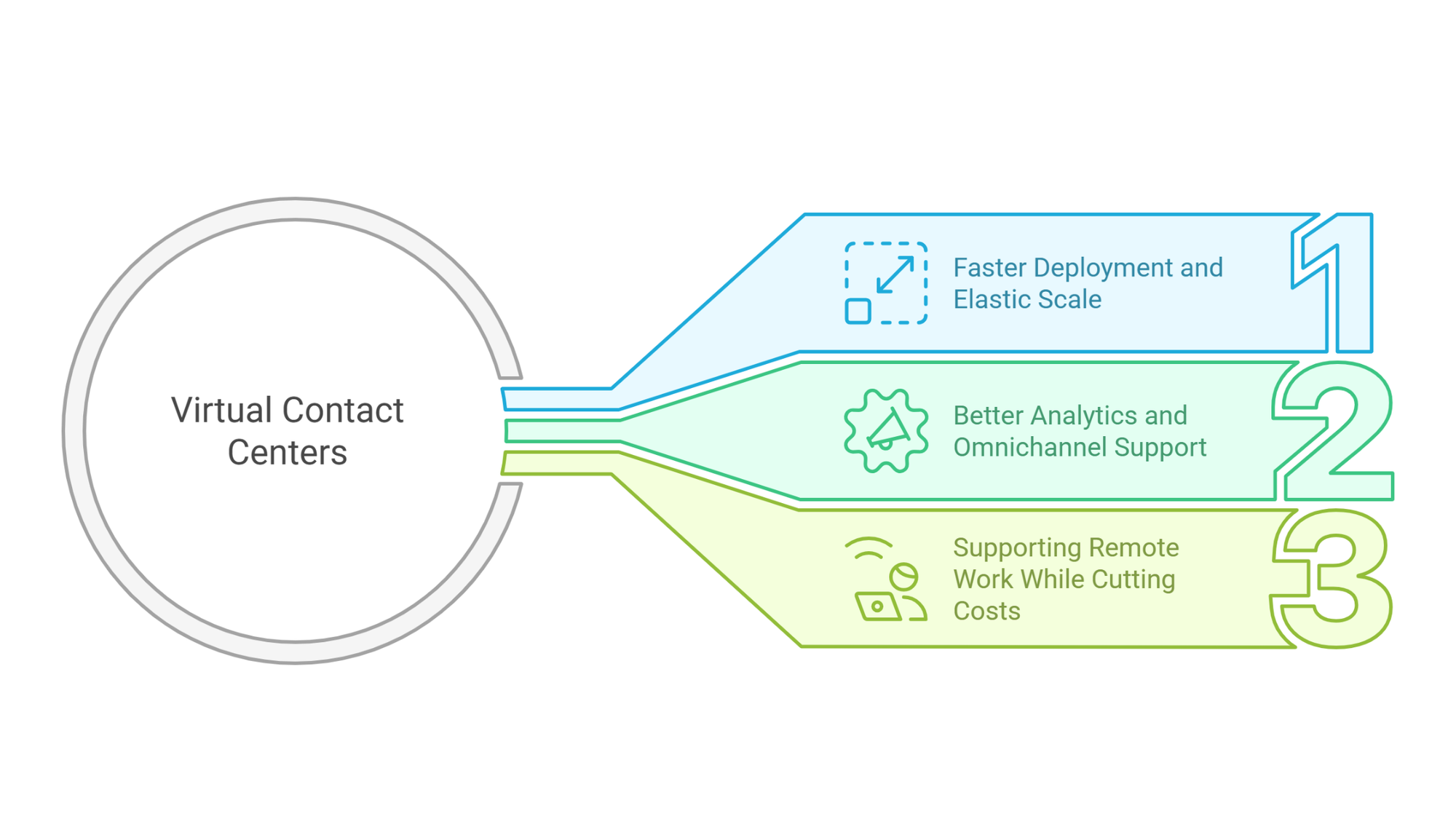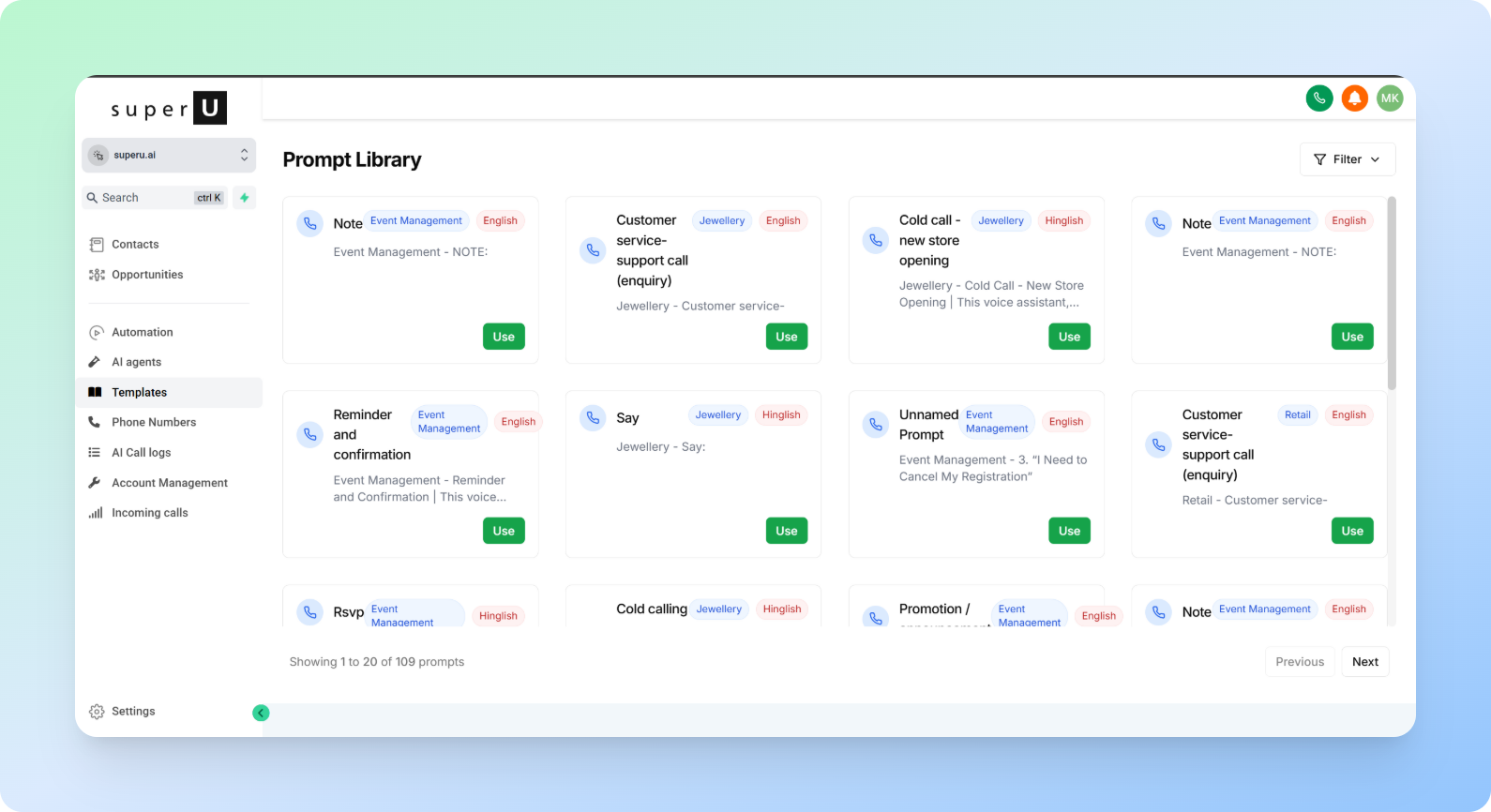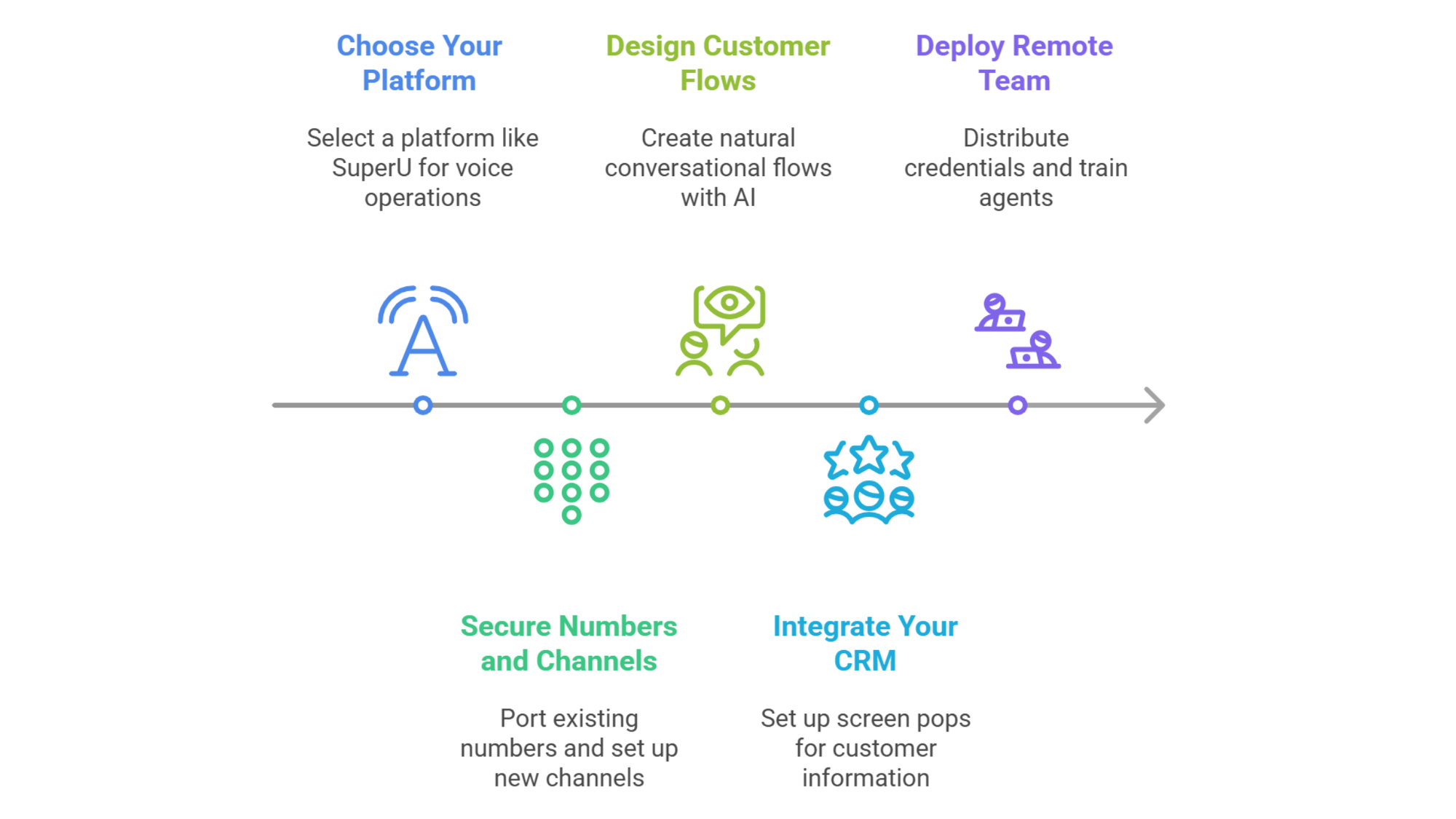What is a Virtual Contact Center?
Think of a virtual contact center as customer support without the physical office. A Virtual Contact Center (VCC) is the best way for businesses to talk to their customers without needing a big office. In this system, customer service agents can handle phone calls, emails, chats, and messages using the internet from anywhere, like from home or even another city.
The key difference between virtual and traditional contact centers isn't just where your agents sit it's how the entire system operates. A virtual call center is a modern customer service solution that uses cloud based technology to enable agents to work remotely. These call centers operate entirely online, allowing agents to handle customer inquiries from anywhere with an internet connection.
Now, you might be wondering: "Isn't this the same as a cloud contact center?" The terms do overlap quite a bit. While "cloud contact center" describes the technology delivery model (software as a service), "virtual contact center" emphasizes the distributed nature of the workforce and the elimination of physical constraints.
Why Teams Are Making the Switch
When I talk to business leaders about virtual contact centers, three main reasons consistently come up:

Faster Deployment and Elastic Scale Moving to the cloud will allow for faster, easier deployments, seamless upgrades, flexible scalability, and reduced capital expenditures associated with on premises setups. Instead of waiting months to install hardware and set up phone lines, you can literally have agents taking calls within hours.
Better Analytics and Omnichannel Support Traditional phone systems give you basic call logs. Virtual contact centers give you insights into customer journeys across every channel phone, chat, email, social media. Their benefits encompass an easy to use web interface, comprehensive reporting capabilities, minimal IT maintenance requirements, and a wide range of powerful features.
Supporting Remote Work While Cutting Costs One of the benefits of a VCC is its ability to span multiple time zones. Workers can be geographically dispersed across different time zones. This means you can provide 24/7 support without paying premium shift differentials, and you're not limited to hiring talent within commuting distance of your office.
Best Platforms to Start
Let me break down the top platforms I recommend, starting with my number one pick:

SuperU (Best for Voice First Teams) If your business relies heavily on voice interactions whether that's support calls, sales calls, or customer outreach SuperU is hands down the best choice I've seen. What sets SuperU apart is their real time Voice AI technology with ultra low latency. We're talking about 200 milliseconds of delay, which means conversations feel completely natural.
Here's what impressed me most: you can deploy SuperU in under 10 minutes with zero setup costs. They support over 100 languages and can handle up to 100 concurrent conversations, scaling up to a million calls per day. For businesses focused on voice interactions, SuperU delivers about 35% cost savings compared to traditional setups.
Amazon Connect Amazon's cloud native solution excels when you're already deep in the AWS ecosystem. The integrations are seamless, and it handles omnichannel well.
Genesys Cloud CX This is the enterprise heavyweight unified routing, AI capabilities, and a feature set that can handle the most complex business requirements.
Talkdesk A solid middle ground option that balances features with ease of use, particularly popular among mid market companies.
Core Features You Need to Consider
When evaluating virtual contact center platforms, here's your essential checklist:
Channel Mix Your platform should handle voice, chat, email, SMS, and social media seamlessly. Customers don't think in channels they just want help.
Intelligent Routing and Modern Voice Technology Here's where I need to
address something important: traditional IVR (Interactive Voice Response) systems are becoming obsolete. You know the experience "Press 1 for sales, press 2 for support" it's frustrating and inefficient.
IVAs, or Intelligent Virtual Agents, offer more sophisticated routing and self service options for customers using natural language processing and artificial intelligence. It offers a more natural and intuitive interface for customers to interact with the company using voice.
Modern AI voice agents can understand natural speech, handle complex requests, and provide personalized responses. They reduce customer wait times by handling multiple interactions simultaneously. As voicebots scale effortlessly with customer demand, businesses can manage high call volumes without compromising service quality.
Quality Management Tools Call recording, real time monitoring, and coaching tools are essential for maintaining service standards.
CRM Integration Your agents need customer context the moment a call comes in. Look for platforms that integrate seamlessly with Salesforce, HubSpot, or whatever CRM you're using.
Security and Compliance This is non negotiable. Ensure your platform handles PCI compliance, HIPAA requirements, or whatever regulations apply to your industry.
How to Set Up Your Virtual Contact Center (Step by Step)

Step 1: Choose Your Platform Start with a pilot. I recommend SuperU for voice heavy operations because of their quick deployment and proven ROI.
Step 2: Secure Your Numbers and Channels Port your existing phone numbers or get new ones. Set up your chat widgets, email routing, and any social media integrations you need.
Step 3: Design Your Customer Flows This is where modern AI voice agents shine over traditional IVR. Instead of old menu trees, design conversational flows that feel natural. Map out customer intents and create responses that actually help people.
Step 4: Integrate Your CRM Set up screen pops so when a customer calls, your agent immediately sees their purchase history, previous tickets, and account status.
5: Deploy Your Remote Team Distribute softphone credentials, train agents on the new interface, and establish monitoring dashboards. With platforms like SuperU, agents can be taking calls within the same day.
Frequently Asked Questions
1. Is "virtual" the same as "cloud"?
They overlap significantly, but "virtual" emphasizes the remote workforce aspect while "cloud" refers to the software delivery model. Most virtual contact centers are cloud based, but not all cloud contact centers enable fully distributed teams.
2. Which teams benefit most?
Multi site businesses, seasonal operations, and companies with remote first cultures see the biggest impact. Cloud contact centers are ideal for remote teams, allowing agents to work with just an internet connection and a browser based interface no on site equipment needed.
3. What about analytics and quality assurance?
Modern platforms include comprehensive recording, real time dashboards, and quality management tools. You'll actually get better insights than traditional systems because everything is digital and trackable.
4. How quickly can we be up and running?
With the right platform, you can have agents taking calls the same day. SuperU, for example, boasts deployment in under 10 minutes for basic setups.
Conclusion
Virtual contact centers deliver three critical advantages over traditional setups: dramatically faster deployment (hours instead of months), flexible staffing that scales with demand, and comprehensive analytics that help you understand and improve customer experiences. The technology has matured to the point where there's no compelling reason to maintain expensive, inflexible on premise systems.
The shift from old IVR phone trees to new gen AI voice agents is a much needed move in customer experience, while cloud based platforms provide the operational flexibility that modern businesses demand.
Ready to transform your customer service? Start with SuperU's voice AI platform deploy in minutes, save 35% on costs.
Start for Free – Create Your First Voice Agent in Minutes


